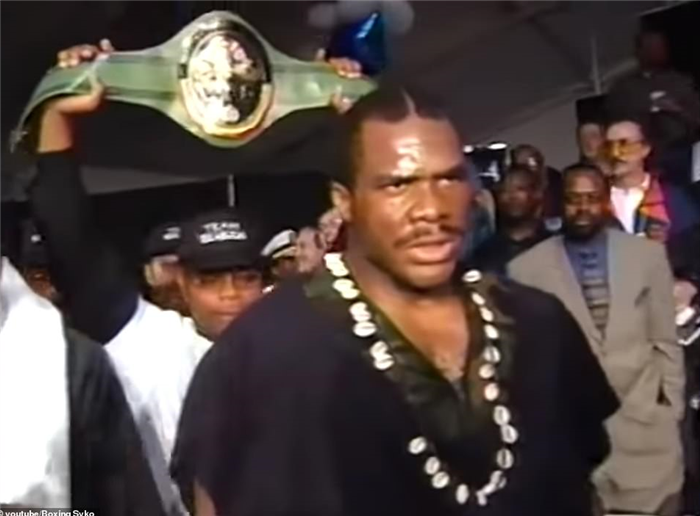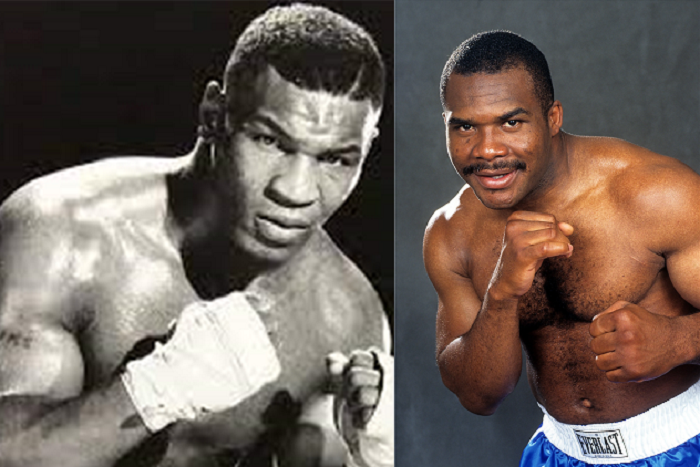Ike Ibeabuchi was an undefeated, hard-punching heavyweight rising star labelled everything from ‘the most dangerous man in boxing’ to ‘the Nigerian Mike Tyson’ in the 1990s.
However the fighter nicknamed ‘The President’ had his ring career cut short before he could even take the world heavyweight title shot that looked to be his destiny. Instead, Ibeabuchi has spent most of the last 24 years in jail, consumed by his own demons and delusions.
Ike still sports the 20-0 (15 KOs) record he built as a professional. His last contest, in 1999, was his most impressive of all when the muscular puncher pulverised the previously unbeaten Chris Byrd – who’d go on to win two world heavyweight titles – inside five rounds.
But Ibeabuchi’s life, which had already included a four-month prison sentence in 1997, was descending into chaos outside the ring. By 1999, he believed he genuinely was the president, that he was the victim of an international conspiracy and that his air conditioning was possessed by evil spirits.
It all came to a head when Ibeabuchi trapped a Las Vegas call girl in a closet in his hotel room, barricaded himself in the bathroom and only surrendered to police when pepper spray was discharged under the door.

Ibeabuchi, who had been inspired to take up boxing after watching his childhood hero Tyson’s upset at the hands of James ‘Buster’ Douglas in 1990, arrived in the US from Nigeria in 1993. After a short but successful amateur career, winning a Texas Golden Gloves title, Ibeabuchi turned pro and racked up a 16-0 record.
But it was his 17th fight that put Ike on the map. The sculpted, 6ft 2in banger met fellow puncher David ‘The Terminator’ Tua in a 1997 battle of unbeaten prospects.
Both men displayed iron chins and remarkable engines as they engaged in a back-and-forth thriller which set a new CompuBox record for punches thrown in a heavyweight fight: a combined 1,730 blows. That record would stand for 20 years, while the unanimous decision win against Tua, the pre-fight favourite, made Ibeabuchi an instant contender.
Yet the warning signs of his inner turmoil were only getting more alarming. Months after the Tua fight, Ibeabuchi kidnapped the 15-year-old son of his ex-girlfriend and crashed his car into a concrete pillar on a Texas highway.
The courts eventually concluded that Ibeabuchi had been trying to kill himself. He was sentenced to 120 days in prison and also paid $500,000 in a civil settlement due to the ‘numerous injuries’ the captured teenager had suffered in the crash.
Ibeabuchi’s fragile mental state was becoming common knowledge. He developed a new persona based on his presidential nickname, believing he truly was a world leader. His handlers would have to coax Ike to attend weigh-ins by telling him it was the noble, regal thing to do.
HBO executive turned promoter Lou DiBella later explained that: “There were times when he thought he was really a president. He would get into these mental states where he insisted on people calling him ‘The President’. It was his alter ego.”

His boxing career resumed after a 13-month delay, with Ibeabuchi scoring two KO wins in 1998. But it was his 1999 demolition of Byrd that truly showed Ike’s frightening combination of power and excellent fundamentals.
Byrd, like Tua, was an undefeated prospect. Though small for a modern-day heavyweight, he was an extremely slippery southpaw who in 2000 would beat Klitschko (when Vitali retired injured after nine rounds) then go the 12-round distance with his brother Wladimir.
Ibeabuchi’s camp for the Byrd fight was tumultuous. He changed trainers at least once – some claimed it was twice – and got into a confrontation with a sparring partner which caused that training partner to leave his camp.

The main problem here being that Ibeabuchi only had one sparring partner at the time. Ike always looked in fearsome shape but it was clear that his training had been a total mess.
In April 2016 Ibeabuchi was rearrested for violating the conditions of his probation and any remaining talk of an improbable ring return finally halted.
In 1999, Ring magazine labelled Ibeabuchi ‘boxing’s most dangerous man’. He had power in both fists, stamina, skills and a seemingly excellent chin. But unfortunately for Ibeabuchi and for all those who met him, he proved to be even more dangerous away from boxing than he was inside the ropes.
